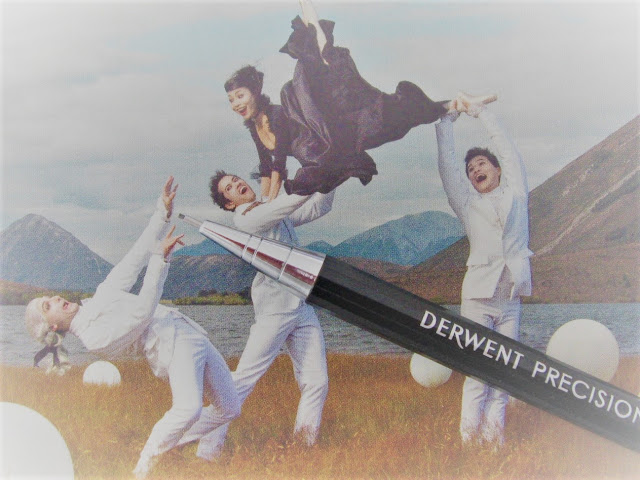Derwent Precision Mechanical Pencil Review
Sometime in the 1500’s the world’s first, and still only, large-scale deposit of high purity solid graphite was discovered in Cumbria, England. So, having discovered pencil lead, all that needed to be invented was the pencil. Many will debate the origins of the pencil, but for my money, if it puts graphite onto paper then its lineage goes back to Cumbria. Today’s direct descendant of the Cumbrian pencil industry is Derwent, who still manufacture in Cumbria. These days Derwent is part of the US multi-national Acco Brands, whose stable of brands also includes Artline, Esselte and Marbig amongst others.The Precision is Derwent’s first foray into the mechanical pencil market. Given their strength is pencils for artists, it is not surprising they are pitching their first mechanical pencil at the art market. Being manufacturers of wooden pencils it is also not surprising that they have contracted out the manufacture of their mechanical pencil. What is perhaps a little surprising though is their choice to go with a thin lead mechanical pencil rather than a leadholder. I assume they thought a 2mm leadholder was too similar to their woodcase pencils and if they were going to go mechanical, they might as well go all in.
First off then the Derwent Precision is a long slim mechanical pencil, somewhat reminiscent of a Derwent woodcase pencil. It is lightweight in the hand and neutrally balanced. The metal body barrel is hexadecagonal… I hope I counted right… and without any specific grip zone or grip enhancements, all again reminiscent of a woodcase pencil. The grip is fine for those who like to vary their grip placement up or down the body, but for extended use I feel that some form of grip enhancement would have been a good idea, even if just a few concentric rings.
The ‘not quite round’ body and pocketclip combine to put some limits on desk rolling. The pocket clip is a good combination of enough strength and spring to be really useful, but not so much as to rip your papers.
The lead sleeve is a 3mm thin metal pipe and it is a sliding sleeve for pocket safety. Combined with the conical tip section there is good vision of the lead for doing fine detailed work. It is also a good rigid system, although it does have lead cushioning.
 |
| How to refill the lead magazine |
The retail hang-sell carded pencil also comes with a refill pack of leads. On the lead refills are three of the most fearful words in the world of mechanical pencil leads, “Made in China”. It has been a long time since I have bothered to buy, use or try Chinese lead, because past experience has lead me to the conclusion that Chinese lead is abysmal. However, Derwent are themselves lead manufacturers and surely they would not risk their long standing reputation on cheap D-grade lead? Now I caution that I have not done any real comparative testing, and that my pencil is 0.7mm, but I must admit that from my general use I have been pleasantly surprised. This Derwent Precison lead is perfectly respectable, and the inviolability of the formula “Chinese + lead = bad + very” is now under threat.
Overall then I think this is a respectable, if unremarkable, general workhorse of a mechanical pencil. The Derwent name and history is what sets it apart, and I think that alone means you should consider adding it to your collection.
• Best Points – It’s Derwent. Opening my eyes to Chinese lead.
• Not So Good Points – The grip
• Price Range – Low
• Does this pencil make it into the Top 5? – No
Dimensions – Length 153mm, ‘diameter’ 8mm. Balance point about 75mm up from the tip.



















